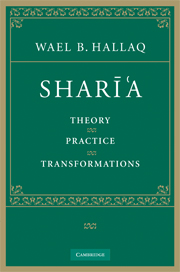Book contents
- Frontmatter
- Contents
- Preface and acknowledgments
- Introduction
- Part I The pre-modern tradition
- Part II The law: an outline
- 6 The legal pillars of religion
- 7 Contracts and other obligations
- 8 Family law and succession
- 9 Property and ownership
- 10 Offenses
- 11 Jihād
- 12 Courts of justice, suits and evidence
- Part III The sweep of modernity
- Appendix A Contents of substantive legal works
- Appendix B Chronology
- Bibliography
- Index
11 - Jihād
Published online by Cambridge University Press: 05 June 2012
- Frontmatter
- Contents
- Preface and acknowledgments
- Introduction
- Part I The pre-modern tradition
- Part II The law: an outline
- 6 The legal pillars of religion
- 7 Contracts and other obligations
- 8 Family law and succession
- 9 Property and ownership
- 10 Offenses
- 11 Jihād
- 12 Courts of justice, suits and evidence
- Part III The sweep of modernity
- Appendix A Contents of substantive legal works
- Appendix B Chronology
- Bibliography
- Index
Summary
Introduction
In the entire repertoire of legal concepts, there is today no more ambiguous and multi-layered term than jihād. The concept is charged with religious, legal, cultural and political connotations, and has proven to be even more controversial than such concepts and practices as polygamy. Its potential and outward militancy invariably provokes hostile reactions from Western observers, even when they are in full cognizance of the fact that jihād is a theory that belongs to the past. The fear of Islam and of its alleged aggressiveness – in itself a constitutive ingredient of Western culture since at least the European Middle Ages – has led even the more prominent scholars to view the theory as if it were an applied reality and – as if this were not problematic enough – to attach to the theory the most negative interpretations. What is even more problematic is a third complicating factor, i.e., the projection of an overcharged negative interpretation of the remote past upon a contemporary reality that bears no resemblance whatsoever to that former era. It appears that paradigmatic Western scholarship – not to mention mass media – has allowed itself to succumb to all three problematics. In this chapter, I will briefly discuss the classical theory of jihād, how it was reinterpreted in light of European colonialism, and – by way of conclusion – its significance today.
- Type
- Chapter
- Information
- Sharī'aTheory, Practice, Transformations, pp. 324 - 341Publisher: Cambridge University PressPrint publication year: 2009



